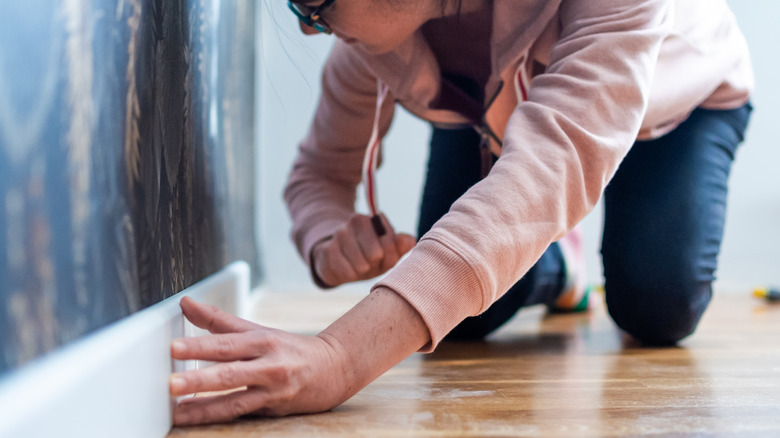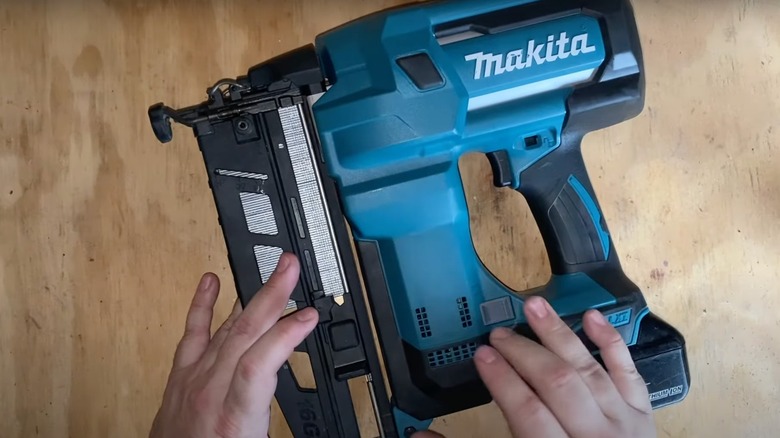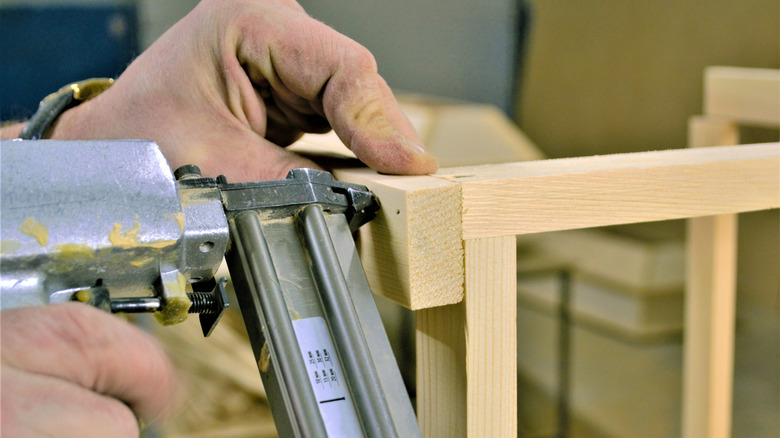Easily Secure Baseboards And Wood Flooring With A Must-Have Tool
We may receive a commission on purchases made from links.
Installing items like high-end wood flooring and baseboards can deliver an increase in value to your home. You might be able to receive a return on investment (ROI) of around 75% with high-quality wood floors. Baseboards add value to the home, too, although many of their benefits come from the practical advantages they provide for protecting walls and floors from damage.
Of course, you need to consider more than just installing hardwood flooring in your home when it comes to unlocking the maximum value. A poorly done DIY installation could end up detracting from the ROI you receive. To successfully install these items yourself and deliver the benefits you're seeking, it's helpful to have the right power tools. One of the handiest tools for securing baseboard and wood flooring is the Makita XNB02Z Cordless 2-1/2-Inch Straight Finish Nailer ($229).
Makita is one of the best power tool brands at Home Depot and other home improvement stores, meaning it should deliver trustworthy results for your project. Because the Makita finish nailer delivers larger diameter and longer nails than a brad nailer, it is perfect for thicker materials like baseboards and flooring planks. These larger finishing nails should hold the wood in place better for areas that often end up suffering some wear and tear from people walking and vacuum cleaners banging into them.
Benefits of using the Makita cordless finish nailer
The Makita nailer can drive finish nails from 1 to 2 1/2 inches in length. This is the perfect range for most wood flooring, which requires finish nails between 1 1/2 and 2 1/2 inches in length. For baseboards, finish nails between 1 1/2 and 2 inches are recommended, meaning the Makita power tool can handle nail lengths in the range you'd need for both flooring and baseboards.
Many people prefer cordless nailers for attaching wood flooring or baseboards because of the freedom of movement, allowing them to move rapidly along the layout. You don't have to deal with the air hose and power cord connected to a pneumatic nailer that uses a compressor when trying to work quickly. Although the pneumatic nailer gives you continuous power, you shouldn't have to worry about running out of battery power for most jobs when using the cordless Makita model. The manufacturer estimates you can drive up to 1,000 finish nails when using a 5.0Ah capacity battery. Considering you only need nails every roughly 16 inches along baseboard, you shouldn't run out of battery on an average-sized job.
If you plan to use the Makita nailer quite often, you'll appreciate that the loading magazine is made from metal. Metal provides better durability for the power tool and helps avoid jams, which can frequently be the cause when the nailer stops working. Should a jam occur, the Makita tool has a lever you can flip to gain access to the area of the jam, making it easier to clear than some other models.
Why you should use Makita's finish nailer instead of its brad nailer for wood floors and baseboards
Selecting the right type of nail gun for a home improvement project will make the work go smoother. Makita also makes a cordless 18V brad nailer (XNB01Z) that some people use for attaching trim work. The Makita XNB02Z tool uses 16-gauge finish nails, while the Makita XNB01Z tool uses 18-gauge brad nails. Although some people use the terms finish and brad nails interchangeably, can you use these tools interchangeably? In other words, if you already own the Makita brad nailer, should you spend the extra money for the Makita finish nailer for attaching wood flooring or baseboards?
Brad nailers are smaller than finish nailers, and they use smaller nails, too. The 16-gauge finish nail has a larger diameter than the 18-gauge brad nail, allowing it to secure thicker material better. A 16-gauge nail will have a diameter of about 1.65 mm (0.065 inches), while an 18-gauge nail has a diameter of about 1.25 mm (0.049 inches).
Because they're thinner in diameter, brad nails work better for tacking items rather than for long-term secure installations. They're better for craft projects or lightweight trim. Finish nailers work much better for products that involve heavy or thick pieces of trim or molding, like baseboards, that may be under some stress. The thicker finish nails also work much better for fastening hardwoods or dense MDF products sometimes used in engineered hardwood flooring planks.


